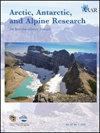Uncertainty factor in contemporary communities of the Russian Arctic: methodological approaches to research
IF 2
4区 地球科学
Q4 ENVIRONMENTAL SCIENCES
Arctic, Antarctic, and Alpine Research
Pub Date : 2022-12-12
DOI:10.30758/0555-2648-2022-68-4-420-436
引用次数: 0
Abstract
The article introduces readers to work on a new research project “Overcoming Uncertainty in Interaction with the Physical and Social Environment in the Russian Arctic” by describing its conceptual and theoretical approach and premises as well as the steps of designing it. It opens with an analysis of the concept of risk, which is currently popular in the Arctic Social Studies and which is sometimes claimed to be the central concept in the field. It proceeds by describing the new approach, which is based on the concept of uncertainty, both natural and social, which constantly accompanies human life in the Far North. The inhabitants of the North know from experience that uncertainty cannot be ruled out, but one can be constantly prepared for it by planning one’s behavior with this factor in mind. Furthermore, one can suggest that the effects of ecological, economic and social changes are experienced by these inhabitants first and foremost as shifts in the level and kind of uncertainty. Therefore, the concept of uncertainty can replace the concept of risk in the studies of the effects of change on northern communities; in fact, “uncertainty” is preferable because its conceived nature is obvious, while in many risk studies, risk is still perceived as something objective. The main questions that a study of uncertainty can answer are: what is the role of natural and social uncertainty in the everyday life of the permanent population of the Arctic? What are the action strategies of the people in the face of uncertainty, including discursive strategies to explain the growing uncertainty? What is the role of state authorities, industrial companies, local organizations, urban and rural communities in overcoming the negative consequences of natural and social uncertainties? How are social connections and networks involved in dealing with situations of uncertainty? The paper demonstrates how these questions can be answered on the basis of anthropological fieldwork. It also uses examples from the Komi Republic (Vorkuta), Yakutia (Chersky settlement), and Magadan area to demonstrate the sort of problems the uncertainty-based approach can contribute to solving. A review of the existing literature in Russian and English is presented in order to give the reader useful insights into the field of uncertainty studies and outline the main directions of research that a study of uncertainty can take当代俄罗斯北极社区的不确定性因素:研究的方法论方法
本文通过描述其概念和理论方法、前提以及设计步骤,向读者介绍了一项新的研究项目“克服俄罗斯北极地区与自然和社会环境相互作用中的不确定性”。它以对风险概念的分析开始,风险概念目前在北极社会研究中很流行,有时被认为是该领域的核心概念。它通过描述基于不确定性概念的新方法来进行,自然和社会的不确定性一直伴随着遥远北方的人类生活。北方的居民从经验中知道,不确定性是不能排除的,但人们可以通过将这一因素牢记在心来计划自己的行为,从而不断为此做好准备。此外,人们可以认为,这些居民所经历的生态、经济和社会变化的影响,首先是不确定性水平和种类的变化。因此,在研究变化对北方社区的影响时,不确定性的概念可以取代风险的概念;事实上,“不确定性”是可取的,因为其设想的性质是显而易见的,而在许多风险研究中,风险仍然被视为客观的东西。不确定性研究可以回答的主要问题是:自然和社会的不确定性在北极常住人口的日常生活中扮演什么角色?面对不确定性,人们的行动策略是什么,包括话语策略来解释日益增长的不确定性?国家当局、工业公司、地方组织、城市和农村社区在克服自然和社会不确定性的消极后果方面的作用是什么?社会关系和网络如何参与处理不确定的情况?本文在人类学田野调查的基础上论证了如何回答这些问题。它还使用了科米共和国(Vorkuta)、雅库特(Chersky定居点)和马加丹地区的例子来展示基于不确定性的方法可以帮助解决的问题。为了给读者提供对不确定性研究领域的有用见解,并概述了不确定性研究可以采取的主要研究方向,对俄语和英语的现有文献进行了回顾
本文章由计算机程序翻译,如有差异,请以英文原文为准。
求助全文
约1分钟内获得全文
求助全文
来源期刊
CiteScore
3.00
自引率
5.00%
发文量
37
审稿时长
7 months
期刊介绍:
The mission of Arctic, Antarctic, and Alpine Research (AAAR) is to advance understanding of cold region environments by publishing original scientific research from past, present and future high-latitude and mountain regions. Rapid environmental change occurring in cold regions today highlights the global importance of this research. AAAR publishes peer-reviewed interdisciplinary papers including original research papers, short communications and review articles. Many of these papers synthesize a variety of disciplines including ecology, climatology, geomorphology, glaciology, hydrology, paleoceanography, biogeochemistry, and social science. Papers may be uni- or multidisciplinary but should have interdisciplinary appeal. Special thematic issues and proceedings are encouraged. The journal receives contributions from a diverse group of international authors from academia, government agencies, and land managers. In addition the journal publishes opinion pieces, book reviews and in memoria. AAAR is associated with the Institute of Arctic and Alpine Research (INSTAAR) the oldest active research institute at the University of Colorado Boulder.

 求助内容:
求助内容: 应助结果提醒方式:
应助结果提醒方式:


